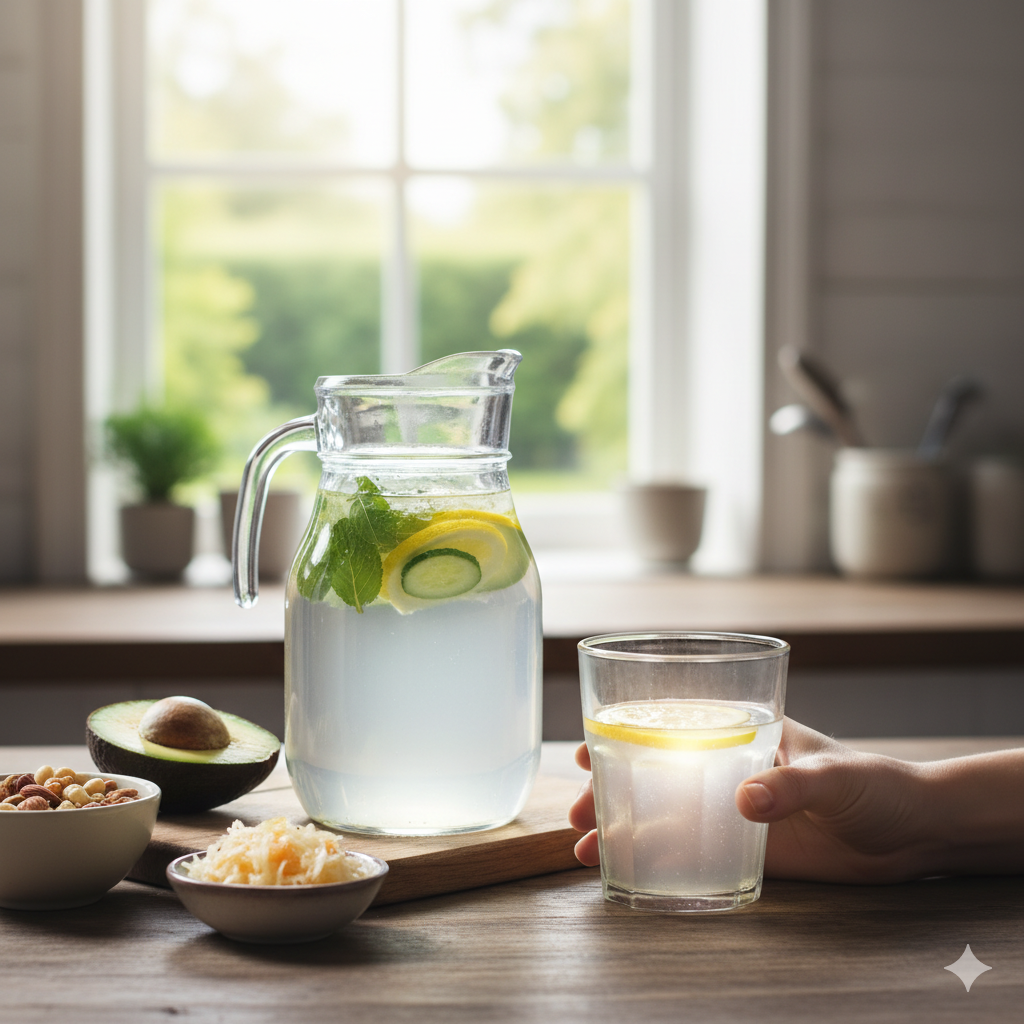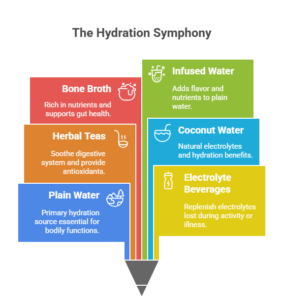
You’ve heard it countless times: “Drink eight glasses of water a day.” It’s one of the most common health recommendations, and for good reason—proper hydration is essential for virtually every bodily function. But here’s something that might surprise you: simply drinking water isn’t always enough to maintain optimal hydration, especially when it comes to your digestive health.
As a gastroenterologist, I frequently see patients who are drinking plenty of water yet still experiencing constipation, bloating, and other digestive issues. They’re confused and frustrated, wondering why their symptoms persist despite following conventional hydration advice. The answer lies in understanding that true hydration is more complex than just water intake—it involves absorption, retention, electrolyte balance, and timing.
Let’s explore the sophisticated relationship between hydration and digestion, and why optimizing this connection can transform your gut health.
The Critical Role of Water in Digestion
Before we discuss why water alone isn’t always enough, let’s understand why hydration matters so much for digestive health.
Water’s Digestive Functions
Water plays multiple essential roles throughout your digestive system. It helps produce saliva, which begins the digestive process in your mouth by breaking down food and making it easier to swallow. In your stomach, water is a key component of gastric juices that help break down food particles.
Water also assists in dissolving nutrients so they can be absorbed through your intestinal walls into your bloodstream. It keeps the mucosal lining of your intestines healthy and lubricated, facilitating smooth movement of food through your digestive tract.
Perhaps most importantly for many people, water is crucial for preventing and relieving constipation. It softens stool, making it easier to pass, and helps maintain proper gut motility—the coordinated muscular contractions that move food through your system.
Signs of Poor Hydration Affecting Digestion
When your body isn’t properly hydrated, your digestive system shows it. Common signs include persistent constipation even with adequate fiber intake, hard, dry stools that are difficult to pass, feeling bloated or uncomfortable after eating, reduced appetite or feeling excessively full, dark-colored urine, infrequent urination, and general fatigue or sluggishness after meals.
If you’re experiencing these symptoms despite drinking water regularly, it’s time to look beyond simple water intake.
Why Plain Water Sometimes Isn’t Enough
The Absorption Problem
Drinking water is only beneficial if your body can actually absorb and utilize it. Several factors can impair water absorption in your intestines.
When you drink large amounts of water very quickly, much of it passes through your system without being absorbed. Your intestines can only absorb water at a certain rate, and excess simply gets eliminated. This is why chugging multiple glasses at once isn’t as effective as steady hydration throughout the day.
Additionally, plain water without electrolytes is absorbed less efficiently than water containing minerals like sodium, potassium, and magnesium. These electrolytes create an osmotic gradient that helps pull water into your cells where it’s needed.
The Electrolyte Balance
Electrolytes are minerals in your body fluids that carry an electrical charge. They’re essential for hydration because they regulate fluid balance, help water move into cells, support nerve and muscle function, maintain blood pH, and enable nutrient absorption.
The most important electrolytes for hydration and digestion include sodium (helps retain water and maintain fluid balance), potassium (regulates fluid inside cells and supports muscle contractions), magnesium (essential for muscle function and gut motility), calcium (supports muscle contractions in the digestive tract), and chloride (helps maintain fluid balance and is a component of stomach acid).
When you drink only plain water, especially in large quantities, you can actually dilute your electrolyte concentration. This is called hyponatremia when sodium levels drop too low, and it can impair your body’s ability to retain and utilize the water you’re drinking.
Individual Variations in Hydration Needs
The “eight glasses a day” rule is a general guideline, but individual hydration needs vary considerably based on body size and composition, activity level and exercise intensity, climate and temperature, diet composition, medications, health conditions, age, and more.
Someone exercising vigorously in hot weather needs dramatically different hydration than someone with a sedentary office job in air conditioning. Your digestive system’s needs also vary based on your fiber intake—higher fiber requires more water to function properly.
The Fiber-Hydration Partnership
One of the most important but overlooked aspects of digestive health is the synergistic relationship between fiber and water.
Why Fiber Needs Water
Dietary fiber, particularly soluble fiber, absorbs water in your digestive tract. This creates soft, bulky stools that move easily through your intestines. Without adequate water, fiber can actually worsen constipation rather than relieve it, creating hard, difficult-to-pass stools.
Think of fiber like a sponge—it only works properly when it has water to absorb. If you increase your fiber intake without correspondingly increasing your water consumption, you may experience bloating, gas, cramping, and worsening constipation.
The Right Balance
For optimal digestive health, you need both adequate fiber (25-35 grams daily for most adults) and sufficient hydration. A good rule of thumb is to drink an extra glass of water for every 5 grams of fiber you add to your diet.
High-fiber foods like beans, whole grains, vegetables, and fruits naturally contain water, but you still need additional fluid intake to support proper digestion of these foods.
Timing Matters: When and How You Hydrate
Strategic Hydration Throughout the Day
How and when you drink water significantly impacts its effectiveness for digestion.
Start your day with water—drinking a glass or two upon waking helps rehydrate after hours of sleep and stimulates bowel movements. Drink water consistently throughout the day rather than only when thirsty; by the time you feel thirsty, you’re already mildly dehydrated.
Drink water 30 minutes before meals to support digestion, but avoid drinking large amounts during meals as this can dilute digestive enzymes. Sip small amounts with meals if needed. Drink water between meals to maintain hydration without interfering with digestion.
Stay hydrated before, during, and after exercise, as physical activity increases fluid needs. Consider drinking warm or room-temperature water, which may be easier on your digestive system than very cold water, especially for those with sensitive stomachs.
Avoid These Hydration Mistakes
Don’t wait until you’re thirsty to drink—thirst is a late indicator of dehydration. Avoid relying solely on caffeinated beverages, as caffeine has a mild diuretic effect. Don’t drink excessive amounts at once; spread intake throughout the day. Be cautious about drinking too much water with fiber supplements without adequate spacing.
Beyond Plain Water: Hydration-Optimized Beverages
While plain water should be your primary hydration source, certain beverages can enhance absorption and provide additional digestive benefits.

Electrolyte-Enhanced Water
Adding a pinch of sea salt to your water or using electrolyte supplements can improve absorption, especially if you’re very active or live in a hot climate. Look for options with minimal added sugar.
Herbal Teas
Herbal teas like peppermint (soothes digestive upset and reduces bloating), ginger (aids digestion and reduces nausea), chamomile (calms the digestive tract), and fennel (reduces gas and bloating) provide hydration plus therapeutic benefits for digestion.
Coconut Water
Natural coconut water contains electrolytes, particularly potassium, making it an excellent hydration option. It’s especially beneficial after exercise or during hot weather.
Bone Broth
While not a beverage you’d drink all day, bone broth provides hydration along with minerals, electrolytes, and compounds that support gut lining health. It’s particularly beneficial for those with digestive issues.
Infused Water
Adding cucumber, lemon, mint, or berries to water makes it more appealing and may encourage increased consumption. These additions also provide small amounts of vitamins and minerals.
Foods That Support Hydration
Hydration isn’t just about what you drink—it’s also about what you eat. Many foods have high water content and contribute significantly to your overall hydration status.
Hydrating Foods Include:
Fruits like watermelon (92% water), strawberries (91% water), cantaloupe (90% water), peaches (88% water), and oranges (86% water). Vegetables like cucumbers (95% water), lettuce (96% water), celery (95% water), tomatoes (94% water), and zucchini (94% water).
These foods provide not just water but also fiber, vitamins, minerals, and electrolytes that support both hydration and digestive health. They’re particularly beneficial because the water is released slowly during digestion, providing sustained hydration.
Medical Conditions Affecting Hydration and Digestion
Certain health conditions make proper hydration more challenging and more critical.
Chronic Diarrhea or Inflammatory Bowel Disease
Conditions causing frequent diarrhea lead to significant fluid and electrolyte loss. People with these conditions need not just more water but also electrolyte replacement to maintain proper hydration.
Kidney Disease
Those with kidney disease must carefully balance fluid intake according to their doctor’s recommendations, as their kidneys may not effectively regulate fluid balance.
Diabetes
High blood sugar causes increased urination, leading to dehydration. People with diabetes often need more fluids and should monitor their hydration status carefully.
Medications
Diuretics, laxatives, and certain other medications increase fluid loss and require adjusted hydration strategies.
Practical Strategies for Optimal Hydration-Digestion Health
Create a Personalized Hydration Plan
Calculate your baseline needs (a common formula is half your body weight in ounces of water daily), then adjust based on activity level, climate, diet, and health conditions. Track your intake for a few days to understand your current habits.
Monitor Your Hydration Status
Check your urine color—pale yellow indicates good hydration, while dark yellow or amber suggests you need more fluids. Monitor bowel regularity and stool consistency. Pay attention to energy levels and how you feel after meals.
Combine Strategies for Maximum Benefit
Don’t rely on just one approach. Instead, drink water consistently throughout the day, include hydrating foods in your diet, add electrolytes when appropriate, consume adequate fiber, time your water intake strategically, and adjust based on your activities and environment.
Address Underlying Issues
If you’re drinking adequate fluids but still experiencing digestive problems, underlying conditions may need attention. Constipation despite good hydration might indicate insufficient fiber, thyroid issues, medications affecting gut motility, or pelvic floor dysfunction.
Persistent bloating could signal SIBO, food intolerances, or IBS. Chronic diarrhea might indicate IBD, celiac disease, or infections.
Special Considerations for Exercise and Heat
Physical activity and hot weather dramatically increase hydration needs. During exercise, you lose water through sweat and increased respiration. For workouts lasting less than an hour, water is usually sufficient. For longer or more intense exercise, you need electrolyte replacement.
A good guideline is to drink 17-20 ounces of water 2-3 hours before exercise, 7-10 ounces every 10-20 minutes during exercise, and 16-24 ounces for every pound lost during exercise.
In hot weather, your body works harder to regulate temperature through sweating, increasing fluid and electrolyte needs even without formal exercise.
The Bottom Line: A Holistic Approach to Hydration
Proper hydration for optimal digestive health isn’t just about drinking eight glasses of water—it’s about understanding your individual needs, timing your intake strategically, maintaining electrolyte balance, consuming adequate fiber, including hydrating foods in your diet, and adjusting for activity and environment.
Think of hydration as a system, not just a single action. When all components work together—adequate fluids, proper timing, electrolyte balance, and sufficient fiber—your digestive system can function at its best.
If you’re experiencing persistent digestive issues despite what seems like adequate water intake, don’t assume you just need to drink more. The solution might lie in how you’re hydrating, what you’re eating alongside that water, or an underlying condition that needs medical attention.
Dr. Preetha is committed to helping patients achieve optimal digestive health through personalized care and evidence-based treatment. If you’re experiencing ongoing digestive symptoms or want to optimize your gut health, contact our office to schedule your consultation.
Your digestive system is sophisticated and deserves more than a one-size-fits-all approach to hydration. With understanding and strategic adjustments, you can optimize this fundamental aspect of your health.
